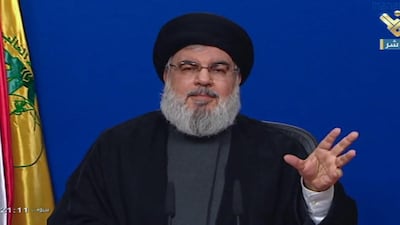Hezbollah chief Sayyed Hassan Nasrallah warned Israel on Tuesday against intimidation, alluding to Israeli combat drills that took place this month. He said any attack would be reciprocated.
"We are not looking for a confrontation but we don't leave the blood of our martyrs. If a confrontation happens we will respond to it. if you attack our cities we will attack yours," Mr Nasrallah said.
The Israeli military held large-scale exercises along the northern border with Lebanon on February 9 and10.
They said at the time the exercises would examine lessons learnt from operational activities that took place along the Lebanese border over the summer and prepare troops for a variety of scenarios, including readiness for “combat days”.
“I want to also warn that these threats we are hearing in recent days – combat days and what not – I want to warn that this game of combat days is a dangerous one,” Mr Nasrallah said.
“No one can guarantee it would not lead to war.”
Israel’s air force said on Monday it began a “surprise exercise” to improve combat readiness along the country’s northern border to last until Wednesday.
The military said that during the drill there would be an increase in air traffic throughout the country and explosions could be heard in northern Israel.
It said the “exercise simulates combat scenarios on the northern front, and will test all components in the [air force’s] core missions, including maintaining aerial superiority, protecting the country’s skies, as well as attacking and gathering intelligence.”
















